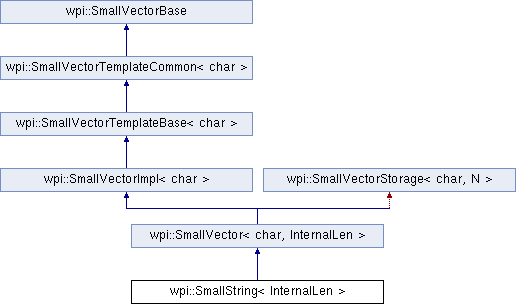|
| | SmallString ()=default |
| | Default ctor - Initialize to empty.
|
| |
| | SmallString (std::string_view S) |
| | Initialize from a std::string_view.
|
| |
| | SmallString (std::initializer_list< std::string_view > Refs) |
| | Initialize by concatenating a list of std::string_views.
|
| |
| template<typename ItTy > |
| | SmallString (ItTy S, ItTy E) |
| | Initialize with a range.
|
| |
| std::string_view | str () const |
| | Explicit conversion to std::string_view.
|
| |
| const char * | c_str () |
| |
| | operator std::string_view () const |
| | Implicit conversion to std::string_view.
|
| |
| | operator std::string () const |
| |
| SmallString & | operator= (std::string_view RHS) |
| |
| SmallString & | operator+= (std::string_view RHS) |
| |
| SmallString & | operator+= (char C) |
| |
|
| void | assign (std::string_view RHS) |
| | Assign from a std::string_view.
|
| |
| void | assign (std::initializer_list< std::string_view > Refs) |
| | Assign from a list of std::string_views.
|
| |
|
| void | append (std::string_view RHS) |
| | Append from a std::string_view.
|
| |
| void | append (std::initializer_list< std::string_view > Refs) |
| | Append from a list of std::string_views.
|
| |
|
| int | compare (std::string_view RHS) const |
| | compare - Compare two strings; the result is negative, zero, or positive if this string is lexicographically less than, equal to, or greater than the RHS.
|
| |
|
| size_t | find (char C, size_t From=0) const |
| | find - Search for the first character C in the string.
|
| |
| size_t | find (std::string_view Str, size_t From=0) const |
| | Search for the first string Str in the string.
|
| |
| size_t | rfind (char C, size_t From=std::string_view::npos) const |
| | Search for the last character C in the string.
|
| |
| size_t | rfind (std::string_view Str) const |
| | Search for the last string Str in the string.
|
| |
| size_t | find_first_of (char C, size_t From=0) const |
| | Find the first character in the string that is C, or npos if not found.
|
| |
| size_t | find_first_of (std::string_view Chars, size_t From=0) const |
| | Find the first character in the string that is in Chars, or npos if not found.
|
| |
| size_t | find_first_not_of (char C, size_t From=0) const |
| | Find the first character in the string that is not C or npos if not found.
|
| |
| size_t | find_first_not_of (std::string_view Chars, size_t From=0) const |
| | Find the first character in the string that is not in the string Chars, or npos if not found.
|
| |
| size_t | find_last_of (char C, size_t From=std::string_view::npos) const |
| | Find the last character in the string that is C, or npos if not found.
|
| |
| size_t | find_last_of (std::string_view Chars, size_t From=std::string_view::npos) const |
| | Find the last character in the string that is in C, or npos if not found.
|
| |
template<unsigned InternalLen>
class wpi::SmallString< InternalLen >
SmallString - A SmallString is just a SmallVector with methods and accessors that make it work better as a string (e.g.
operator+ etc).


